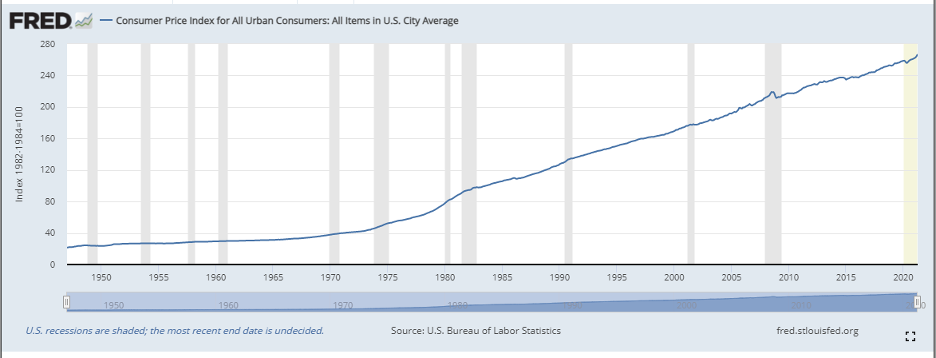On February 19, 2020, the S&P 500 index hit an all-time high of 3,386. Just over a month later, on March 23, 2020, the index fell to 2,237, a drop of 33%. It was the fastest sell-off in US stock market history. The Coronavirus had become a global pandemic and the near-term future for the American economy looked bleak.
However, inspired by massive government intervention and the prospect of vaccines, investors quickly reversed course and drove the market higher. The S&P 500 index set a record for its fastest recovery and it notched new all-time highs again and again over the course of the next 14 months.
However, over the course of the past month, the stock market has been trading in a narrow range, neither plummeting again, but also not continuing its meteoric rise. Why? Inflation.
Investors have hit the pause button, because they fear that unprecedented fiscal and monetary policy actions, taken by Congress and the Federal Reserve, respectively, will result in inflation that will eventually throttle the economy. If you’re retired, inflation is one of the biggest threats to your long-term financial security. So, let’s consider inflation and how you can minimize its impact on your financial plan.
What’s inflation?
Inflation is the reduction of purchasing power over time. The price of goods and services increases. The faster this happens, the greater the destructive impact of inflation.
How is inflation measured?
Economists track the prices of a basket of certain goods and services. There are several measures of inflation. The most common is the consumer price index for all urban consumers (or “CPIAUCSL”). Here’s a historical chart of the index over the past seven decades:

Source: St. Louis Fed
The rate of inflation over the past 25 years looks like this:

Source: Trading Economics
We can see that the overall rate of inflation has hovered around 2% over this period. However, if you go back the late 1970s and early 1980s, inflation was much higher.
For those who are retired, there’s a less common and somewhat experimental index called the R-CPI-E which is calculated by the U.S. Bureau of Labor Statistics. The index over-weights medical care. As you might imagine, this index tracks slighter higher than the CPIAUCSL, because healthcare costs have been rising faster than other goods and services for some time.
What’s the current rate of inflation?
We saw the rate inflation spike to 4.2% in April 2021. This is well above the average of the past 10 years. It shook investors and heightened concerns about the Federal Reserve’s ability to contain inflation at its target of 2%.
What causes inflation?
The are two basic causes of inflation. Demand-pull inflation occurs when demand for products and services is greater than the supply and thus pulls prices higher. Cost-push inflation occurs when supply costs push prices higher.
Investors are currently concerned that the federal government has driven consumer demand higher by injecting trillions of dollars of support into the economy. They’re also concerned that the Federal Reserve has driven demand by lowering its reserve requirement, lowering the Fed Funds rate, and purchasing massive amounts of Treasury debt.
Why is inflation a problem?
Inflation erodes your purchasing power. The higher inflation is, and the longer it remains high, the more destructive it is. Consider, for example, a first-class postage stamp. In 1995, a stamp cost 32 cents. Today, it’s 55 cents. That’s an average annual increase of 2.1%. How about a gallon of gasoline? In 1995, it cost $1.15. Today, in Portland, Oregon, it costs $3.30. That’s an average annual increase of 4.1%.
If you’re fortunate enough to live 30 years or longer in retirement, inflation will cause the prices of everything you consume to go up. So, you need to plan for inflation. If you have an actual retirement plan built using a robust software program, it should include an assumption that’s slightly higher than the actual historical rate of inflation. That will give you a bit of a buffer, if inflation begins to creep up. You should also adjust the assumption as economic conditions warrant. At Springwater, we’re currently building retirement plans with an inflation assumption of 2.75% per year.
How can retirees combat inflation?
Most retirees are conservative investors. They prefer investments that are safe and provide income. Many years ago, retirees could invest in bank products – like savings accounts, CDs and money market accounts – and high-quality corporate and US government bonds, and earn a modest income. Unfortunately, because interest rates have been so low for so long, conservative investments like these no longer provide a meaningful amount of income. In addition, if inflation does remain at a higher level, these fixed income investments will lose value.
One key to combating inflation in retirement is to invest in assets that have certain important characteristics:
- A store of value: the asset should not lose value when interest rates rise and inflation increases.
- Liquidity: you should be able to sell the asset and receive cash without the price changing.
- Marketability: you should be able to sell the investment at any time, in a robust market of buyer and sellers.
Here are some assets that can be good hedges against inflation:
- Stocks
- Floating rate bonds
- Series I Savings Bonds
- Treasury Inflation-Protected Securities (TIPS)
- Real Estate
- At times, commodities, gold and other precious metals
We’ll return to this topic in a future article and explore how each of these assets can help retirees combat inflation.
Final Thought
It‘s too early in the US economic recovery from the pandemic to know if inflation will be a problem for retirees in the years ahead. However, it’s not too early for retirees to be thinking about it and planning for it.
Looking for Guidance?
If you need help staying on course in retirement, consider working with a Certified Financial Planner™ (CFP®), Certified Public Accountant (CPA), a Chartered Financial Consultant® (ChFC®) or an RICP (Retirement Income Certified Professional®). Advisors who hold these designations have met rigorous educational, experience and ethics requirements.
If you’re looking for help with planning and investing for retirement, contact us today to see how our team at Springwater Wealth can help you.
